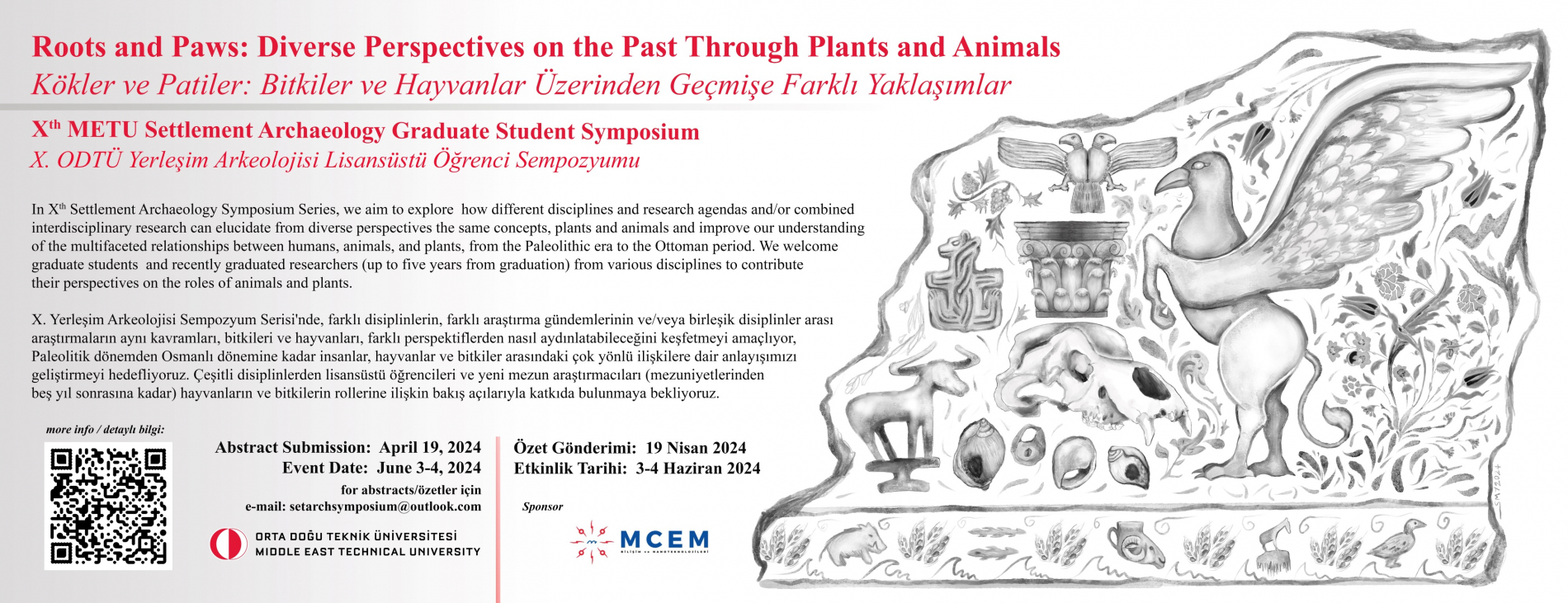Call for papers: Settlement Archaeology Symposium Series X: Roots and Paws: Diverse Perspectives on the Past Through Plants and Animals
- English
- Türkçe

Date of Event: 3rd-4th, June 2024
Abstract Submission: 19th, April 2024
Submission and info: setarchsymposium@outlook.com
Animals and plants have always been influential parts of human social and economic lives. They have played decisive roles in the social and economic behavior of societies and individuals in the past. Initially used for basic human needs such as food and shelter, they later became economic commodities. Furthermore, human interaction with them extends far beyond utilitarian usage; they have also been part of wider concepts such as power symbols, ritual, religion, mythology, and art. These elements shape and regulate social structures by assigning symbolic significance to the elements observed and interacted with in their environment. Thus, it is important to understand and share knowledge about how people might have perceived them in the past.
In X. Settlement Archaeology Symposium Series, we aim to explore how different disciplines and research agendas and/or combined interdisciplinary research can elucidate from diverse perspectives the same concepts, plants and animals and improve our understanding of the multifaceted relationships between humans, animals, and plants, from the Paleolithic era to the Ottoman period. We welcome graduate students and recently graduated researchers (up to five years from graduation) from various disciplines to contribute their perspectives on the roles of animals and plants. Research themes are:
- Economic and Utilitarian Perspectives: Discussing the exploitation and appropriation of animals and plants in the past as seen in aspects such as diet, food preparation, sharing and consumption, domestication, agricultural and animal husbandry practices, transhumance and nomadism, trade, raw materials for sheltering, furnishing, and clothing.
- Ecological/Environmental Impacts and Sustainability: Exploring what information we may obtain from plants and animals about the impact humans had in their environment and vice versa (climate change, depletion of soils by agriculture, overgrazing, human adaptations to changing environments etc.). Addressing related sustainability challenges, elucidating the evolving dynamics of human-environment interactions, and discussing how these studies would contribute to decision making about present and future sustainable development.
- Symbolism, Mythology, Ritual and Religion: Exploring how plants and animals were perceived and utilized in different cultures to display social status, power, authority, gender and group/ethnic identity as well as their roles in myths, religious beliefs, and ritual practices (as tangible elements, for example, representations in art and artifacts, personal ornamentation, sacrifices, divinity and libations and intangible elements such as rules of expected behavior, taboos and prohibitions, didactic story telling).
- Stewardship, Outreach, Dissemination: Animal and plant remains contained within archaeological sites are veritable archaeological materials. Nevertheless, they are often not collected or partially collected during excavation, when collected almost always put in inaccessible storage and almost never in museum displays, often they are the subjects of very informative but destructive methodological techniques and when studied and published rarely these results are disseminated to the public. Here we call papers to address these problems.
- Interdisciplinarity: Does it work? Animals and plants are often the subject of interdisciplinary research in archaeology. To wrap up the symposium, we would like to call for a round – table discussion where we can evaluate whether or not, how and with what problems interdisciplinarity has been applied in archaeology. Papers can be presented during this activity to underline relevant issues and these papers will be followed by an hour-long discussion. We envision the outcome of the discussion as a further paper to summarize the points raised during the round table.
Join us on this journey in the friendly environment of the beautiful METU campus. We look forward to meeting and sharing with you!
